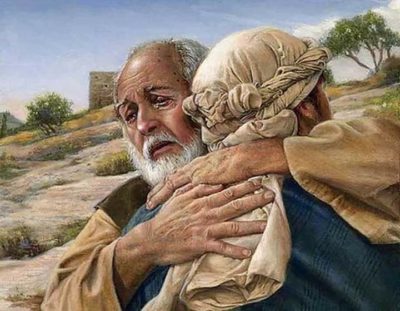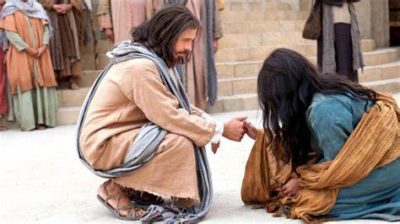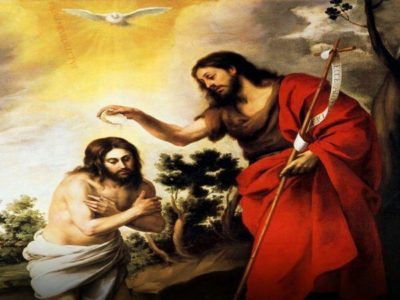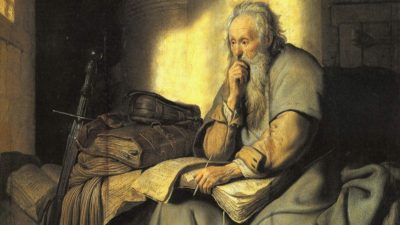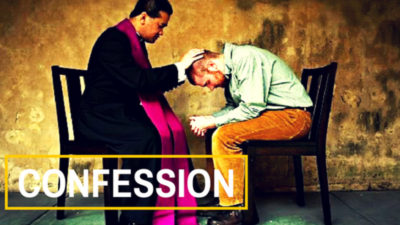April 3, 2022
|by N W
|
0 Comments
|
Compassion, Father Nixon, Forgiveness, Healing, Love, Mercy, Repentance
|
Judging Others
Fifth Sunday of Lent
April 3, 2022 — Year C
Readings: Is 43:16-21 / Ps 126 / Phil 3:8-14 / Jn 8:1-11
by Rev. Nixon Negparanon, Pastor
There is a little-known sidelight to the story of the woman taken in adultery. After the Pharisees dragged her before Jesus for sentencing, and Jesus says, “Let anyone among you who is without sin be the first to throw a stone at her,” a stone comes flying from the crowd. Jesus looks up, frowns slightly, smiles a little and says, “If you don’t mind, mother, I am only trying to make a point here.”
In one way, this is a good joke because it shows the natural tendency of good people like the Pharisees and the Scribes to throw stones at those they consider sinners. In other ways it is a bad joke because it tries to paint sinless Mary in the colors of sinful humanity. The last person who would want to throw a stone at the woman caught in adultery would be the Blessed Virgin Mary, God’s most favored one. According to the joke, Jesus says He’s trying to make a point here. So now the question is: What is the point that Jesus is trying to make? Why would the Church give us this story for our spiritual nourishment on the last Sunday before Holy Week, when we commemorate the suffering and death of Jesus on our behalf?
The story of the woman caught in adultery had a very curious history in the early Church. Many ancient Bibles do not have it. Some have it as part of a different chapter in the Gospel of John. Still others have it as part of the Gospel of Luke. Some scholars think that originally this story could have been part of Luke’s Gospel. Why? Because it reflects themes that are dear to Luke, such as concern for sinners, interest in women, and the compassion of Jesus.
The fact that it is missing in some early Bibles and found in different locations in others suggest that some early Christian communities had removed this story from the Bible. When later Christians tried to put it back into the Bible, they were no longer sure of its original location.
So why would anyone want to remove this story from the Bible? There are people who cannot understand why Jesus would sympathize with a convicted adulterer. After all, it is decreed in the Bible that such offenders should be put to death. (Lv 20:10)
Does this not seem like an obstruction of justice? What do you think? Perhaps you remember the case of Karla Faye Tucker, a self-confessed repentant murderer who was executed in Texas in February 1998. Many Christian organizations, including the Vatican, pleaded for her pardon, yet her execution was carried out. Supporters of the death penalty argued that no one should interfere with the course of justice. Well, Jesus just did in our gospel today.
There are people who think that compassion and leniency are a sign of weakness. These are probably the kind of Christians who tried to suppress the story by removing it from the Church’s Bible. How could Christians read this marvelous story of Jesus’ compassion and still take a hardline stand with regard to correctional services?
The answer lies in how one reads the story. Some people identify themselves with the Pharisees when they read it. Their interest is in how to deal with other people who break the law. Their answer is usually that justice should be allowed to run its due course.
Now you can begin to understand, in the history of the Church, why the medieval Church did not see anything wrong with burning at the stake convicted witches like Joan of Arc. Didn’t the Bible say that no one who practices sorcery should be allowed to live? That is the law; that is justice. Our only duty is to implement it.
But when we read this story, identifying ourselves, not with the Pharisees, but with the woman herself, then we begin to see the story for the good news that it really is. Like the woman, we all have sinned and fallen short of the glory of God. Like her, we all deserve death. Why? Because the scripture says “the wages of sin is death.” But when Jesus comes into the picture, He overturns our death sentence. He sets us free with His words of absolution: “Neither do I condemn you. Go your way and sin no more. “
The story shows how Jesus stands up for sinners before the law. In doing so, he draws upon Himself the hostility of the hardline officers, who will eventually arrest Him and give Him a taste of their justice. The Church puts this story before us today, so that we can see ourselves in the sinner woman, whom Jesus saves from sure death, at the risk of attracting death to Himself.
This season of Lent urges us not to be judgmental of others. We are all sinners and in need of God’s mercy and grace. Only God has the right to judge people, because He alone is perfect.
Somebody said that God Himself does not propose to judge a person until he’s dead. So why should we judge him?
Sometimes people ask me, “Father, is it wrong to judge?” Of course, the answer is: It depends on how you deal with judgment.
There are two ways of judging people: with compassion or without mercy. If we judge the person with compassion, just like Jesus did, then we are doing the right thing. If we judge the person without mercy, without compassion, then we end up like the Scribes and the Pharisees in our gospel today. They want the woman to be stoned to death. Or we end up being like the older brother in the parable of the Prodigal Son. He could not accept his brother for having squandered his parents’ money and property.
Someone asked me yesterday, “Father, what if I tell my children, “Don’t go with a drug addict.’ Am I judging the drug addict?”
Of course, that is a different story. Your intention is not to judge the drug addict, but to keep your children away from drugs.
Or how about Putin, who killed all these innocent people? Are we not going to judge him? Judge him with mercy. That is what Jesus wants us to do. Mother Teresa of Calcutta reminds us of this when she said, “If you judge people, you have no time to love them.”
So perhaps the question we need to ask ourselves is this: When do you judge and act like the Pharisees and the Scribes? Are there times when you judge others because of your biases and prejudices? Are there times when you judge others even though you only know a little about the person?
If you are a person who judges others, try reflecting on these pieces of advice:
1) Never judge someone without knowing the whole story. You may think you understand, but you don’t.
2) Never judge someone by the opinion of others. Often, we are victims of this kind of judgment. We easily listen, especially when the person telling us the judgment or the criticism is someone we trust, or someone who is close to us.
3) Every single person on the planet has a story. Don’t judge people before you truly know them. The truth might surprise you. Sometimes it is very easy to judge a person by their face, especially if the person’s face is ugly or he looks like a madman. But we may end up realizing that the person leads a very saintly life. And there are people who look like saints, but the way they lead their life is the other way around.
4) Don’t judge a person without fully understanding them. Just because you and the person don’t agree doesn’t mean you’re right.
We must be conscious that the way we judge things is limited. Our minds, our intellect, is just limited. That’s why, in philosophy, only God is an unlimited being. He’s the only perfect being. We, created beings, are all limited beings. Even our thinking is limited; the way we say things; the way we understand things; the way we hear things is limited, and prone to mistakes. If we are aware of that from the very beginning, then we end up realizing that we are not supposed to judge others right away. Jesus is telling us in our gospel today to judge others with compassion, with mercy, so that we won’t end up to be condemning.
We may be hounded by remorse for our past sins we have committed, like stealing, giving or accepting bribes, committing abortion, gossiping, making intrigues, or infidelity to one’s spouse. We feel we must do something more in order to make a balance of our spiritual account sheet. In short, make reparations.
So, this story is a fitting preparation for Holy Week. We see Jesus making the ultimate sacrifice to grant us clemency; we who are already sentenced to death by our sins.
As we prepare for Holy Week, let us thank Jesus for His mercy and love. And let us promise him that we shall commit ourselves to doing exactly as He tells us: To go and sin no more.
KEEP READING
 540-586-8988
540-586-8988 


